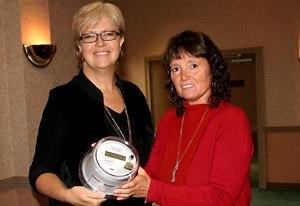by Laura Walz [email protected] BC Hydro representatives addressed a number of issues that have been raised about smart meters during a presentation to Powell River Chamber of Commerce on October 13.
Fiona Taylor, deputy project officer for BC Hydro’s smart metering program, outlined the benefits of the meters, which are currently being installed in the Powell River area. She was accompanied by Harper Hadden, stakeholder engagement advisor with the program.
Opposition to smart meters has been growing in BC, with opponents raising a number of concerns, including the possible health effects of the wireless technology, the cost of the program and concerns about privacy. Last month delegates at the Union of BC Municipalities annual convention passed a resolution calling on the government to stop the program.
Taylor explained that meters are a part of BC Hydro’s electricity distribution system. “What smart metering represents to BC Hydro is a key step in our program of modernizing the grid,” she said.
Smart meters collect information on an hourly basis and send that information through a network to BC Hydro, Taylor said. The meter will only collect how much electricity is being used on an hourly basis, she added, and it stores that information on a chip, then sends it out three times a day. “There’s no personal information stored on the meter, there’s no way of knowing who you are from what’s on that meter,” she said.
Today, BC Hydro’s electricity system is “very blunt,” Taylor said. “We’re really quite deaf, dumb and blind when it comes to the granularity of what is happening with the power on the system.” The upgrade to smart meters will enable the utility to install distribution system meters and develop theft analytics software.
As well, BC Hydro will be making available tools to consumers to help them conserve energy. A web-based portal will be available in April 2012, which will enable consumers to see hourly information of what BC Hydro collected off the meter. In addition to consumption, the portal will provide other information, such as a comparison with neighbours and with a typical home that is comparable in size, how long before the consumer will hit tier two rates and tips. “We’re trying to make it an interactive, highly informative website to help customers understand what they are doing with their power and what they can do to control that.”
Today’s grid is “very one way and we don’t have a lot of information,” Taylor said. “With smart meters, we are adding almost two million eyes and ears to the grid. We have a much better idea of what’s happening with our power and therefore we can manage it better.”
As well, the upgrades will enable small-scale electricity generation by customers and communities.
Taking in all the costs of smart meters, the program nets out to over $500 million positive benefit, which reduces the pressure on rates, Taylor said. She also said that 80 per cent of the benefits come from improvements to the system, including better outage management, theft detection, reducing electricity waste, enabling customers to conserve and optimization of distribution assets.
In addressing health concerns, Taylor said a smart meter has a low frequency and low power radio, which is one-one-hundredth of the power of a cell phone and is also less than 50 per cent of the strictest standard in the world. “In total, all communication that that meter is going to do amounts to less than one minute a day.”
Addressing comments about the lack of consultation, Taylor said that smart metering is a key initiative for utilities around the world that are modernizing their grid. “It’s business as usual for a utility. It is not a normal business practice in our business to go and publicly consult on things that are our everyday business.”



